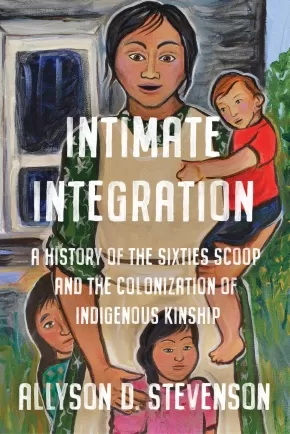Allyson D. Stevenson
Allyson D. Stevenson is an assistant professor in the Department of Politics and International Studies at the University of Regina.
Books (1)
Synopsis:
Privileging Indigenous voices and experiences, Intimate Integration documents the rise and fall of North American transracial adoption projects, including the Adopt Indian and Métis Project and the Indian Adoption Project. Allyson D. Stevenson argues that the integration of adopted Indian and Métis children mirrored the new direction in post-war Indian policy and welfare services. She illustrates how the removal of Indigenous children from their families and communities took on increasing political and social urgency, contributing to what we now call the "Sixties Scoop."
Making profound contributions to the history of settler colonialism in Canada, Intimate Integration sheds light on the complex reasons behind persistent social inequalities in child welfare.
Reviews
"While the process of Truth and Reconciliation in Canada has raised awareness about residential schooling, what remains less known is the equally devastating systemic and ongoing assault on Indigenous children through the child welfare system. Allyson D. Stevenson thoroughly maps out this truth, shedding new light on the role of the state in causing multigenerational trauma to Indigenous families." — Kim Anderson, Canada Research Chair in Indigenous Relationships, University of Guelph, author of A Recognition of Being: Reconstructing Native Womanhood
"Intimate Integration is politically sharp, carefully researched, and intellectually generous. Allyson D. Stevenson transforms how we see modern Canadian colonialism and the range of ways that Indigenous people have resisted and rebuilt in the face of it." — Adele Perry, Department of History and Women’s and Gender Studies, University of Manitoba
"Deftly weaving together academic training in history and lived experience as a Métis adoptee, Allyson D. Stevenson provides a path-breaking, powerful, eye-opening study that is essential reading for Canadians seeking to understand the trauma of child removal on Indigenous families and communities as well as their resistance and resilience." — Sarah Carter, Department of History and Classics, University of Alberta
Educator Information
Table of Contents
Prologue
Introduction
1. The Bleeding Heart of Settler Colonialism
Indigenous Legal Orders and the Indian Act
From wáhkôhtowin to Transracial Adoption
2. Adoptive Kinship and Belonging
Gender and Family Life in Cree Métis Saskatchewan
The Emergence of the Euro-Canadian Adoption Paradigm
Indigenous Adoption and Euro-Canadian Law
3. Rehabilitating the “Subnormal [Métis] Family” in Saskatchewan
4. The Green Lake Children’s Shelter Experiment: From Institutionalization to Integration in Saskatchewan
The Social Work Profession and the Rationalized Logics of Indigenous Child Removal in Saskatchewan
5. Post-War Liberal Citizenship and the Colonization of Indigenous Kinship
The 1951 Indian Act Revisions and the rise of “Jurisdictional Disputes”
6. Child Welfare as System and Lived Experience
Adopting a Solution to the Indian Problem
7. Saskatchewan’s Indigenous Resurgence and the Restoration of Indigenous Kinship and Caring
8. Confronting Cultural Genocide in the 1980s
Conclusion: Intimate Indigenization
Epilogue: Coming Home
Bibliography
Primary Sources
Interviews
Newspapers
Government Documents
Statues, Regulations, and Court Cases
Statutes of Canada
Saskatchewan Statues
Statutes of the United States
Archival Series
Printed Government Documents
Canada. Department of Citizenship and Immigration. Indian Affairs Branch. Annual Reports, 1950–1965
Printed Primary Sources
Secondary Sources
Websites
Additional Information
352 pages | 6.00" x 9.00" | 47 illustrations | Paperback







